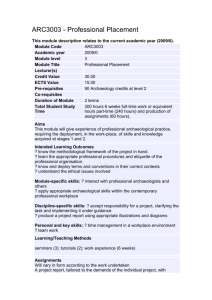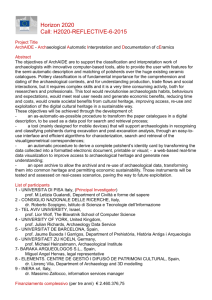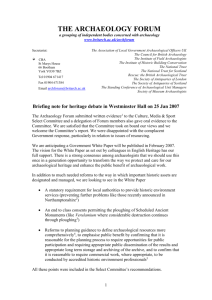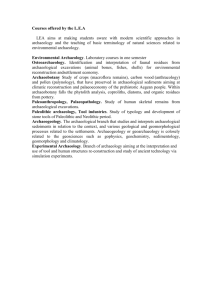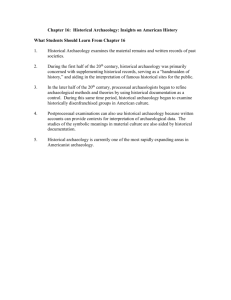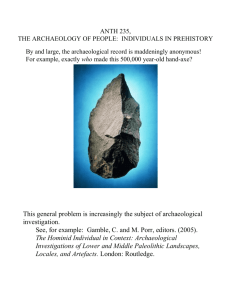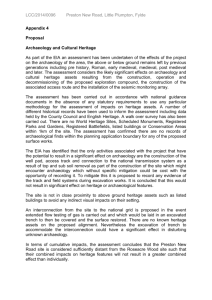evidence from the archaeology forum
advertisement
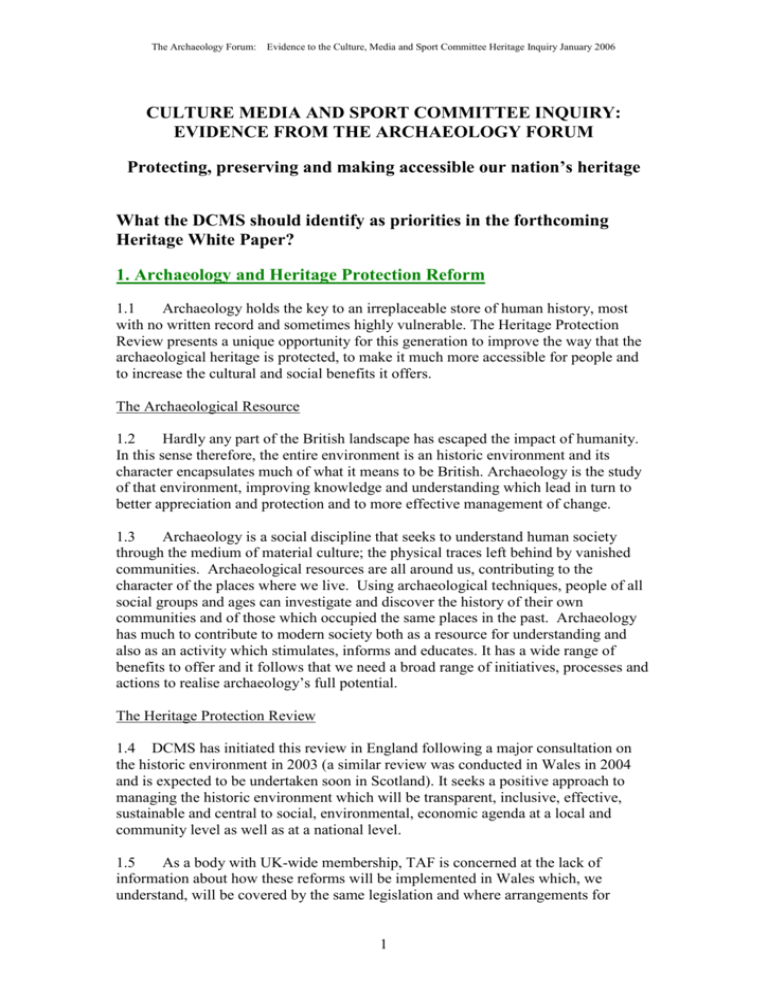
The Archaeology Forum: Evidence to the Culture, Media and Sport Committee Heritage Inquiry January 2006 CULTURE MEDIA AND SPORT COMMITTEE INQUIRY: EVIDENCE FROM THE ARCHAEOLOGY FORUM Protecting, preserving and making accessible our nation’s heritage What the DCMS should identify as priorities in the forthcoming Heritage White Paper? 1. Archaeology and Heritage Protection Reform 1.1 Archaeology holds the key to an irreplaceable store of human history, most with no written record and sometimes highly vulnerable. The Heritage Protection Review presents a unique opportunity for this generation to improve the way that the archaeological heritage is protected, to make it much more accessible for people and to increase the cultural and social benefits it offers. The Archaeological Resource 1.2 Hardly any part of the British landscape has escaped the impact of humanity. In this sense therefore, the entire environment is an historic environment and its character encapsulates much of what it means to be British. Archaeology is the study of that environment, improving knowledge and understanding which lead in turn to better appreciation and protection and to more effective management of change. 1.3 Archaeology is a social discipline that seeks to understand human society through the medium of material culture; the physical traces left behind by vanished communities. Archaeological resources are all around us, contributing to the character of the places where we live. Using archaeological techniques, people of all social groups and ages can investigate and discover the history of their own communities and of those which occupied the same places in the past. Archaeology has much to contribute to modern society both as a resource for understanding and also as an activity which stimulates, informs and educates. It has a wide range of benefits to offer and it follows that we need a broad range of initiatives, processes and actions to realise archaeology’s full potential. The Heritage Protection Review 1.4 DCMS has initiated this review in England following a major consultation on the historic environment in 2003 (a similar review was conducted in Wales in 2004 and is expected to be undertaken soon in Scotland). It seeks a positive approach to managing the historic environment which will be transparent, inclusive, effective, sustainable and central to social, environmental, economic agenda at a local and community level as well as at a national level. 1.5 As a body with UK-wide membership, TAF is concerned at the lack of information about how these reforms will be implemented in Wales which, we understand, will be covered by the same legislation and where arrangements for 1 The Archaeology Forum: Evidence to the Culture, Media and Sport Committee Heritage Inquiry January 2006 heritage services are significantly different. The heritage sector in Wales remains largely uninformed about the aims of the reforms to be presented in the White Paper and there has been no public dialogue and consultation to inform the process, as has taken place in England. There are issues both in terms of building capacity for local delivery and maintaining the regional heritage services for archaeology that have evolved in Wales. The Archaeology Forum believes that urgent consideration should be given to this. Public consultation on the framework for implementation of HPR in Wales is needed to ensure that Welsh and English systems for protecting and managing change in the historic environment are properly inter-related and integrated. 1.6 The administration of listed building designation has already been transferred to English Heritage. During 2005, while HPR pilot work has proceeded, there has been an open and inclusive consultation over the introduction of a new statutory framework for designation, unification of consent regimes, the introduction of statutory management agreements, and enhanced local delivery of heritage services by local government. 1.7 Three major concerns for archaeology arise from the HPR English Heritage is required to take on a considerably enhanced remit while its resources from Government have continued to decline year-on-year New and wider responsibilities within the new system will devolve to local authorities, inevitably bringing associated resource implications which remain to be addressed and resolved New statutory duties are required to ensure that there is a common requirement for delivery of local heritage services to implement the reforms effectively. Historic Environment Records 1.8 Historic Environment Records (HERs) are databases central to the protection of the historic environment and provide comprehensive information about heritage assets that is essential for the effective management of change. Nearly every local authority in Britain now maintains or has access to an HER and the ministerial statement that launched the HPR in June 2004 contained the welcome requirement for local authorities to do so. A key concern in any forthcoming legislation is that HER services should be made statutory responsibilities of local authorities. This is an essential action in all three countries of England, Scotland and Wales. Class Consents 1.9 The DCMS Ministerial Statement of June 2004 recognised the issue of class consents to be one needing resolution. Activities permitted under the Ancient Monuments (Class Consents) Order allow pre-existing, damaging practices to continue on the sites of ancient monuments, despite their being protected under the 1979 Ancient Monuments Act. This is a particularly critical issue for nationally 2 The Archaeology Forum: Evidence to the Culture, Media and Sport Committee Heritage Inquiry January 2006 important sites that remain under the plough. A recent case receiving much media attention was that of the Romano-British town of Verulanium at St Albans. While this case is now resolved, it is not feasible to negotiate mitigation of the impacts of agricultural activities for every individual designated site. The Archaeology Forum believes that legislation should be introduced to withdraw the Class Consents Order and that there should be preparation for an early implementation of withdrawal of Class I Consents for agricultural activities. 3 The Archaeology Forum: Evidence to the Culture, Media and Sport Committee Heritage Inquiry January 2006 The balance between heritage and development need in planning policy. 2. Archaeology and planning policy guidance 2.1 In 1990, Policy Planning Guidance 16: Archaeology and planning (PPG 16) set out ‘the Secretary of State’s policy on archaeological remains on land, and how they should be preserved or recorded both in an urban setting and in the countryside’. The document built upon accepted practice in the most forward-thinking authorities and enlightened developers, developing the precautionary and ‘polluter pays’ policy of EC Directive 85/337. Basic principles were archaeology is a ‘material consideration in the planning system’ due weight must be given to the protection/preservation of archaeological sites (‘a finite and non-renewable resource’, ‘part of our national identity’) in planning decisions and use of planning conditions ‘preservation by record’ may be a reasonable alternative to preservation in situ in some circumstances, especially for sites which only exist below ground it is the developers’ responsibility to arrange evaluation of archaeological sites to enable informed planning decisions to be made, and to arrange excavation, recording and publication as required by planning authorities to be carried out by professionally qualified archaeologists before development proceeds. Similar planning policies were developed in Scotland, Wales and Northern Ireland. Although different in detail, the principles and the effects, problems and necessary improvements are broadly the same. 2.2 PPG 15 Planning and the historic environment was issued for ‘identification and protection of historic buildings, conservation areas and other elements of the historic environment’ in 1994. 2.3 Effects archaeologists within local authorities used the guidance in PPG 16 to lessen dramatically the appalling loss of sites of the past 30 years. The Association of County Archaeological Officers (now ALGAO, the Association of Local Government Archaeologists) played a key role in developing procedures to make the new system effective English Heritage has been able to switch funding from ‘rescue’ to a more strategic role as developers have been free to choose which archaeological contractors and consultants they use (provided these could meet briefs set by local authorities), a system of competition rapidly developed. New commercial archaeological organisations were formed; charitable trusts adjusted to take on an expanded role, and local authority field units were separated sufficiently from ‘curatorial’ archaeologists to permit competition on a level playing field. competition has become fierce, normally price-led, and managed by job-by-job competitive tendering 4 The Archaeology Forum: 2.4 Evidence to the Culture, Media and Sport Committee Heritage Inquiry January 2006 to maintain and improve standards of work and of employment practice the Institute of Field Archaeologists (IFA) published standards and guidance for various aspects of archaeology and, in 1996, launched its Registered Archaeological Organisations (RAO) scheme of accreditation for fast-expanding professional organisations conservation officers have been able to exert tighter controls over alterations to listed buildings. Current situation PPG 16 has been spectacularly successful in expanding the excavation of archaeological sites that would otherwise be destroyed without record standards overall have improved, as increased funds have allowed development of new techniques and an expanding highly-motivated workforce some sites have been preserved through the use of imaginative mitigation strategies which allow ‘preservation in situ’, or sites are partially or totally excavated and recorded (though at times the area excavated is too small to allow a meaningful interpretation of the archaeology of the site) curators are able to demand a level of publication known as ‘grey literature’ after all fieldwork, documenting results adequately for developers and for archaeologists responsible for development control PPG 15 has not led to a comparable level of recording or analysis of buildings, although archaeologists use it to ensure recording of post-1750 (mostly industrial) buildings PPG 15 has been used more effectively to protect buildings from demolition or unacceptable alteration The balance of funding for archaeology has moved from almost entirely public (pre-1990) to principally private sector, demonstrated by recent figures in England: Central government (inc EU funding) Developers Local government Others (HLF, National Trust, CBA, charities etc) (increase due to HLF) 20001 £18.8m £68.3m £25m £7.1m 2003/42 £18m £144m £28m £23m There are currently no good figures for Scotland, Wales or N Ireland 2.5 Outstanding problems Archaeologists on the ODPM working group on PPS15 Planning for the Historic Environment (representing CBA, IFA, ALGAO, EH, working with representatives of IHBC and PAS) identified the following problems: Aitchison K 2000, ‘The funding of professional archaeological practice in England’, in Cultural trends 39, 1-32 Estimates only, calculated via methodology used for 2000 using updated data available and inflationary increases where not. It is hoped that the figures will be calculated for 2005 by K Aitchison as part of the Heritage Counts process. 1 2 5 The Archaeology Forum: Evidence to the Culture, Media and Sport Committee Heritage Inquiry January 2006 definition o the historic environment needs to be defined widely to include palaeoenvironmental deposits and artefact scatters o to include investigation and recording of buildings damaged or destroyed in development and to publish the results (partly a PPG 15 problem) omissions in terms of public benefit. Guidance is absent or unclear on the need o to store, conserve and display artefacts recovered during fieldwork o to analyse and publish excavation results in forms suitable and accessible for the archaeological community and the wider public o to involve the public in excavations in their neighbourhood and to open sites for visitors o to maintain historic environment records minimal guidance on quality assurance, including the need for planning authorities to specify o that work must be carried out in accordance with IFA standards o that work must be carried out by accredited organisations or individuals Many archaeologists overcome these restrictions, and some developers support them, but the lack of clear guidance leaves enlightened implementation of planning guidance open to challenge. 2.6 There is also concern that fierce competitive tendering is slowing improvements in the quality of archaeological work, exaggerating job insecurity and holding down pay and conditions at unacceptable levels. This is primarily a problem that the IFA needs to address, but a fundamental obstacle to improvements is the absence of any barriers to entry to professional practice. Parliament needs to ensure that systems of accreditation are robust, required and properly implemented. As a result, the public are not benefiting as they could from the expansion in archaeological knowledge – undermining the principle of planning guidance: that archaeology is a matter of public interest. 2.7 Recommendations a broader definition of the historic environment stress the importance of preserving archaeological sites, especially where there are above-ground remains that are a valuable element of the historic environment mitigation by recording below-ground remains is still a sound principle where in situ preservation is not feasible and must include making results publicly available approved schemes of fieldwork should include provisions for storage, conservation and display of artefacts and archives in museums and other appropriate depositories publication guidelines should be upgraded and broadened all fieldwork reports should be made publicly available in digital form through OASIS (Online AccesS to the Index of Archaeological InvestigationS) 6 The Archaeology Forum: Evidence to the Culture, Media and Sport Committee Heritage Inquiry January 2006 outreach functions (including use of volunteers) should become an integral part of excavations which have significant interest to the public, and access by visitors should be encouraged where health and safety issues permit national standards of work by professional bodies should be safeguarded through improved guidance to require use of accredited professionals and professional standards implementation of the Valletta Convention, applying a robust system of accreditation based on existing IFA QA procedures (but avoiding creation of barriers to public participation in archaeology) presumption in favour of protecting historic buildings from all unacceptable alteration to be retained proper recording and analysis of historic buildings before alterations are permitted. 7 The Archaeology Forum: Evidence to the Culture, Media and Sport Committee Heritage Inquiry January 2006 Access to heritage and the position of heritage as a cultural asset. 3. Archaeology and education 3.1 The remains of the past provide not just an opportunity to learn about the past, but also resources for the teaching of a variety of subjects. The skills of the archaeologist offer a new way of looking at evidence and understanding the world around us. Archaeology degrees are taught in 43 UK universities (30 in England), attracting c1,000 students every year. It has long been a vibrant subject in university outreach through adult continuing education, with c1,000 courses using archaeological evidence being offered every year to part-time students. The last 30 years have seen the number of students taking archaeology within 14-19 qualifications (GCE and GCSE) grow from 19 students in 1975 to over 2,000 in 2005. 3.2 In 5-14 education, archaeology is not a taught subject in its own right, but archaeological evidence is stipulated within the history curriculum with the requirement to use artefacts, buildings and sites as evidence for the past. Teachers can also use archaeology to support other subjects in the curriculum, chiefly geography or design and technology (but others are also possible). OFSTED reports have noted how archaeology has been beneficial for pupils and has played a notable part in raising levels of achievement (eg the Newcastle Reticulum project). 3.3 However, decisions made about formal education do not fully reflect the role that archaeology can play as a cultural asset, its popularity, and its importance. There are some key areas of policy where current frameworks or decisions have been bad for archaeology, and for education. Lifelong learning 3.4 The emphasis on expanding higher education through entry to university straight from school or college (even if with a gap year), and on vocational courses has encouraged universities to narrow their provision for adult part-time education. The health of the traditionally strong voluntary sector in archaeology and of local community heritage groups depends on having access to up-to-date archaeological knowledge and skills through widely available part-time university level education. Continuing education also provides initial entry into archaeological careers for mature adults. Yet we have seen the increasing centralisation of courses at university campuses (not always accessible for the majority of people), a rise in fees for courses, replacement of easy access evening and weekend courses by less accessible weekday part-time courses, and even the closure of traditional liberal adult education provision leaving large areas without access to courses at all (eg at universities like Leeds, Durham, Essex, Surrey and Exeter). 3.5 We need a commitment to funding courses that contribute towards community activism and quality of life, and recognition of the special needs of continuing education within the funding and assessment frameworks for higher education. Research Assessment should recognise disciplinary research being done outside mainstream departments 8 The Archaeology Forum: Evidence to the Culture, Media and Sport Committee Heritage Inquiry January 2006 Subject review should recognise the teaching and learning practices of continuing education and encourage greater mainstream department links with continuing education Subject specialism 3.6 At 14-16, young people are beginning to explore their subject interests and future lives. It is important they have a choice of pathways and subjects that will enthuse them, and allow them to develop their interests and skills. It is unfortunate that the government did not accept in full the Tomlinson Report into 14-19 education, which would have enabled the creation of a flexible, relevant and exciting 14+ education system. In 2005, the AQA awarding body decided to axe on grounds of cost a number of GCSE subjects, archaeology among them (not offered by any other body). Awarding bodies should not be able to determine curriculum choice solely on financial considerations. There must be a commitment to review the constitution and legal status of awarding bodies Greater powers must be given to QCA to direct the content of the 14-19 curriculum Government should support development of new-style subject qualifications at GCSE and GCE, eg archaeology and heritage or environmental studies (looking at both the cultural and ‘natural’ environments) National curriculum 3.7 The DfES Curriculum and Staffing Survey (2003) showed that 24% of secondary history teachers were non-specialists with little or no historical training. We know that many teacher training institutions misinterpret the TTA guidelines and refuse to admit archaeology graduates onto PGCE courses. There is also widespread realisation that teachers need to be encouraged and supported to take their pupils outside the school to learn in a non-classroom environment. Government needs to support subject communities like archaeology in delivering training for new and practising teachers in how to use nonmainstream educational resources and skills, and in enhancing their subject knowledge We support moves to promote learning outside the classroom, and would like to see a commitment to promoting the understanding of the whole environment as part of this; urban and rural, the built and the ‘natural’, contemporary and historic. 9 The Archaeology Forum: Evidence to the Culture, Media and Sport Committee Heritage Inquiry January 2006 Funding, with particular reference to the adequacy of the budget for English Heritage and museums and galleries, the impact of 2012 Olympics on Lottery funding and the future share from Lottery sources between good causes. 4. Archaeology and lottery funding Funding for archaeology 4.1 The Heritage Lottery Fund has invested £3 billion in heritage since it began giving grants in 1995. This has been a welcome addition to public provision for the heritage, and has gone some way to remedy under-funding in other areas. 4.2 HLF places great emphasis on encouraging access, education and enjoyment. Heritage is never funded for its own sake, but for the opportunity that it provides for grassroots participation. Happily, this emphasis on people coincides with the zeal that many archaeologists have for to sharing their passion for the discipline and for helping people discover the riches of the historic environment. 4.3 This shared goal should contribute to a happy and fruitful partnership between archaeology and the HLF. In fact, HLF estimates that it has funded around 330 archaeological projects, totalling £115 million, which is only 0.038% of the total amount of money disbursed by HLF. Much of this funding has gone into the acquisition of objects and collections for public display and research, support (on a temporary basis) for the Portable Antiquities Scheme, enabling Historic Environment Records to be made available over the internet, and building interpretation centres (for example, at Segedunum (Wallsend) on Hadrian’s Wall, at Creswell Crags in Derbyshire). 4.4 What is largely missing from this list is what most archaeologists would recognise as the bedrock of their discipline: research-based fieldwork and excavation. Some funding has been made available for fieldwork using local volunteers (for example at Silchester, Dig Manchester, Dodderhill in Worcestershire and Rochford in Essex), but much more is needed and the lack of funding for of such work is often given as the reason that archaeologists tend to feel divorced from the lottery. Community entitlement 4.5 People today are hungry for participation in archaeology. Research carried out by the CBA and by the All-Party Parliamentary Archaeology Group has revealed a huge public appetite for getting involved. The success of National Archaeology Days is further evidence of the interest that exists in archaeology, as is participation in activities organised under the aegis of the Portable Antiquities Scheme. 4.6 We believe that this appetite for participation in heritage is a very positive force within society that has myriad benefits. Moreover, we believe that it is entirely 10 The Archaeology Forum: Evidence to the Culture, Media and Sport Committee Heritage Inquiry January 2006 right that people should want to understand the history of their own locality and that entitlement to a rich natural and historic environment is part of everyone’s birthright. 4.7 The challenge is therefore clear: Government, HLF and archaeologists must support each other in finding exciting ways to get more people involved in learning about and caring for the historic environment. Challenges for archaeology 4.8 Archaeologists need to address the deficit by submitting imaginative projects for funding that will unite amateur and professional in the pursuit of answers to important questions. This can be achieved either through a series of small-scale projects (ideally ones that contribute to a bigger research framework) or a series of national projects (a precedent for this exists already in the CBA’s award-winning Defence of Britain project). 4.9 Such projects will succeed better in attracting lottery funding if they are genuinely participative. Recognising that people want different levels of commitment and engagement with heritage, there is also a need to offer a menu of entry points and to cater for the different needs of people at different stages in their lives. A menu of entry points/options might include taster days, green gyms, working weekends, weeklong summer camps and even longer periods of work on archaeological excavations. Challenges for the Heritage Lottery Fund 4.10 In the context of sustainable communities, a move from professional-led to community-led heritage decision making and participation will not happen unless HLF is prepared to build the necessary capacity and dedicate funds to schemes that are targeted at achieving this goal. The HLF should understand that archaeology consists of both a field of study (the past, as represented by the material traces of past human activity) and a set of diverse techniques and procedures which must be taught to aspiring archaeologists by experienced practitioners. We look for a commitment to funding a national rollout of schemes that prove through pilots to facilitate both the learning and the teaching process. Amongst schemes that could achieve this we would commend Opportunities to participate in long-running excavations providing new skills and a recognised practice qualification heritage summer camps, built on the work of the Young Archaeologists’ Club moves to make it easier for people to apply for lottery money – there is much evidence that communities currently struggle with the bureaucracy of heritage lottery fund application forms and processes, and that this deters applicants active facilitation to encourage applications, mentoring and the sharing of good practice, perhaps through evening classes specifically designed to help would-be applicants, many of whom have no experience of the fundraising, charity law or project management issues involved in running an HLF project 11 The Archaeology Forum: Evidence to the Culture, Media and Sport Committee Heritage Inquiry January 2006 Challenges for Government 4.11 We would urge Government to recognise that HLF has met the many complex targets given to it that relate to access, inclusion, education and enjoyment and is a very positive force for social good in mobilising community participation in heritage. We would ask Government to allow HLF to continue to build on this good work and recognise that many of the goals that Government has for heritage as a public good and as a force for social cohesion are being achieved and have great potential. 4.12 We would therefore argue that there is much to be gained by allowing heritage to continue as a dedicated funding stream within the range of good causes supported by the lottery. We further believe that the needs of heritage are so pressing and so persistent that any diminution in the amount of money available for heritage from the lottery will be harmful to the historic environment and lead inevitably to erosion and loss of a non-renewable resource. 4.13 We viewed with considerable concern proposals in the Lottery Bill aimed at diminishing HLF’s balances because we believe this shows a fundamental misunderstanding of the time that it takes for complex heritage projects to be put together from different funding sources, with many partners. We ask Government to recognise the point that has been made on many occasions by the HLF that balances are not uncommitted funds, but prudent reserves, and that applicants need to know that funding is available for them to draw down when they need to. 4.14 Research shows that the quality of the outcomes from HLF projects is closely related to the amount of expert input, and we ask Government to recognise that archaeological experts are necessary as facilitators and mediators, and that expert input into archaeological projects is vital if appropriate standards are to be maintained and if the participants are to learn from their experiences. Whilst welcoming wider public consultation on how lottery money should be spent, we would also council caution in relying on Restoration-style TV programmes as a primary source of decisions, and we would view with alarm any moves that would undermine the role of HLF trustees and expert advisors. 12 The Archaeology Forum: Evidence to the Culture, Media and Sport Committee Heritage Inquiry January 2006 What roles and responsibilities should be for English Heritage, the HLF, local authorities museums and galleries, charitable and other non-Governmental organisations in maintaining the nation’s heritage? 5. Archaeology and our international responsibilities 5.1 We believe that the UK is well placed to act as a leader in demonstrating our commitment to our international responsibilities through UK accession to, and implementation of, a number of important European and worldwide Conventions. Chief among these are: The Hague Convention 5.2 There are over 100 state parties to the landmark Hague Convention of 1954 for the Protection of Cultural Property in the Event of Armed Conflict. Crucially, to date, the UK and the USA are not among them. 5.3 In 2003 the Government confirmed that it was now content that the UK ratify the Hague Convention and its two Protocols. The Forum warmly welcomes the very significant progress being made by the Government to ratify the 1954 Convention and accession to its two Protocols and to consult with the UK heritage sector on its implementation. It strongly agrees that ratification will help to improve standards of protection for the UK movable and immovable heritage and send a strong signal to the international community about the UK Government’s commitment to respecting and protecting the cultural property of other nations and upholding international humanitarian law. 5.4 Implementation of the Convention must be both comprehensive and robust, but also realistic. The Forum recognises the need to balance the protection of as much of our heritage as possible, whilst avoiding a policy that sets out to protect so much that it is counterproductive to the level of protection that can be provided by the Convention. 5.5 The DCMS consultation issued in 2005 was a welcome step forward in the move towards ratification of the Convention, but the recommendations for protection did not pay sufficient regard to the need to cover a proper representation of archaeological sites and monuments. We would like to see a commitment to prioritising assessment of scheduled ancient monuments within the Heritage Protection Review in England, and equivalent processes elsewhere in the UK, with the aim of introducing grading as the basis for selection for general protection under the Convention. The UNESCO Convention on Underwater Cultural Heritage 2001 5.6 The Forum welcomes the support of the Government for the general principles and objectives of the 2001 UNESCO Convention (hereafter the ‘2001 Convention’), particularly those set out in the Annex, which represents internationally accepted standards of archaeological good practice. 13 The Archaeology Forum: Evidence to the Culture, Media and Sport Committee Heritage Inquiry January 2006 5.7 We believe that the 2001 Convention represents the first multilateral treaty specific to the protection of underwater cultural heritage, in the spirit of Article 303, Par.4 of the UNCLOS Convention; and is the only realistic opportunity for a comprehensive international regulatory framework for the marine historic environment. 5.8 The Forum supports the October 2005 Burlington House Declaration and calls on the Government to re-evaluate its position regarding the 2001 Convention with a view to considering how its specific reservations to that convention may be overcome. 5.9 The Government should also ensure that the proposed Marine Bill takes into account and mitigates to the full extent as necessary the impact of marine activities on the marine historic environment. The Valletta Convention 5.10 In March 2001 the European convention on the protection of the archaeological heritage (revised) (the ‘Valletta Convention’) came into force in the United Kingdom, Isle of Man and Channel Islands. The Convention contains important provisions for protecting and conserving the archaeological heritage, setting standards for excavation and other destructive activities, preventing illicit circulation of archaeological objects, and promoting public access to sites and information. 5.11 We believe that in a number of areas UK practice does not yet comply with the provisions of the Convention. Issues to address include a wider definition of the archaeological heritage than is used in UK legislation and (by extension) planning guidance improved designation of heritage assets greater incentives for the protection of heritage assets, especially for those threatened by developments outside the planning process a requirement to maintain records of archaeological monuments and areas mandatory reporting of chance finds making available ‘appropriate storage places for archaeological remains which have been removed from their original location’ promotion of public awareness and access to the archaeological heritage, including better and more appropriate means of dissemination and greater opportunities for school students to learn about archaeology ensuring that destructive methods of investigation are competently conducted to appropriate standards 5.12 There are particular sensitivities concerning the last point. Government and relevant archaeological bodies have consistently stated that they do not intend that implementation of this clause should prevent the voluntary sector from participating in archaeology, but should maintain or raise standards of archaeological practice all round. A voluntary code and an accreditation system are being developed and must fully reflect this spirit, although some criticism is inevitable. 14

